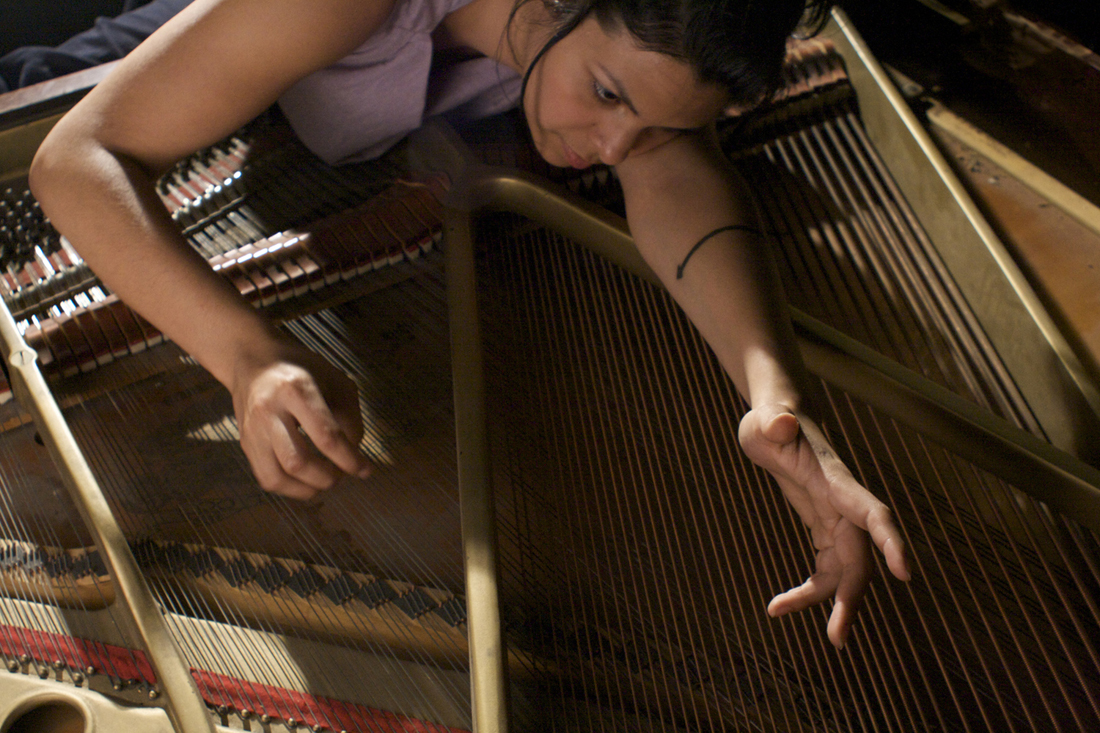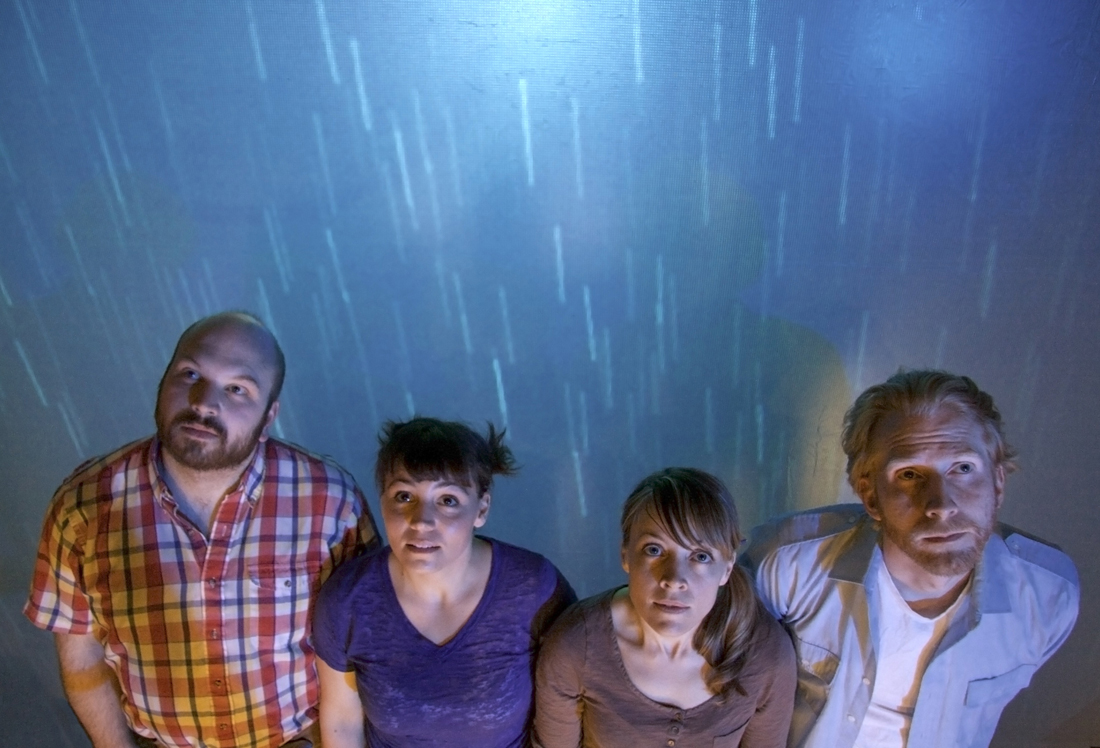Love and Beauty and Other Big Sticky Things
Lightsey Darst reviews two shows from Red Eye's recent New Works 4 Weeks series of works-in-progress: "Awaken Absurdity" by Taja Will and "I Like You" by Laura Holway.


THIS REVIEW IS GOING TO BE ABOUT BEAUTY, or love, or both — those big sticky things.
I remember winning an argument about beauty — whether it existed, whether it had any reality — by pointing to the changing meaning of beauty, to the unanswerable and always-undermining fact of relativity. I won not so much because of this shopworn idea, and still less because of my jejune rhetoric, but because I was beautiful (young and pretty, I mean — that usually does the trick). Others watched while I beat my (older, male) opponent into submission with my invulnerable face. Must have been an enjoyable spectacle — Beauty Argues for Her Own Non-Existence.
At the time, I just wanted to see if I could win (as we know now, if we hadn’t realized it before, arguing is always about winning). I wasn’t actually all that convinced by my own argument; I simply saw it was the only one that could be logically insisted on (Beauty=0) and didn’t look beyond that. Since then, I’ve thought about what could be said on the other side, how I would answer myself now, or how I would answer a much more recent opinion of mine as well, the idea (expressed in a review in this space), that the beauty of beautiful people does not in itself justify art.
The trigger for this self-examination is Taja Will’s Awaken Absurdity, recently performed in the Red Eye’s invaluable New Works 4 Weeks series. In the first section of this work, a multi-form (dance, music, speech) structured improv for three, I lost the train of whatever Will meant to put forward about dream and narrative (“Tell me a story,” she says over and over); I was lost in looking at the beauty and vitality of Will and her companions. When Vitali Kononov struggles to get into an undershirt, it’s mildly amusing that he can’t find the head-hole, but the figure he meantime displays, and the confidence with which he does so, is more than mildly anything. Will’s a triple threat, I know from other shows, but beyond some clever dance doodles at the intersection of back wall and floor, I didn’t notice her talent in this show. Her gleaming teeth, her glowing skin — her sheer radiance — is more impressive than what she does with it here. And why not, really? When you can shine like that, why not?
The second section of Awaken Absurdity is even more abandoned to beauty. A pack of lovely people (including, most notably, Amy Behm and Brian Evans) bound around in improv and children’s games, tag, Marco Polo, then strip and frolic at the front of the stage, hitting what would be ordinary people’s limits and gleefully breaking right through them. The eye gets dazed by all this — intoxicated, at once lost and free. I felt like a very honest male friend who, after I took him to see his first dance performance, explained that he’d had a hard time watching the dance because he’d been distracted by all the beautiful girls in revealing clothes. At the time I thought it a gauche thing to say, but now I don’t know. Dance allows what our culture generally prohibits — staring, feasting really — and this permission may be one of its greatest gifts to us.
So, how would I answer the argument against beauty, made by my younger self? The answer goes like this: in saying that beauty is not stable and therefore has no reality, you are assuming that human life works the way logic does. But our life does not; life is a mystery, not a syllogism. At the heart of our culture are not orderly propositions, but involved dreams. The meaning — the dress — of beauty may change, but the idea never goes away.
______________________________________________________
Once you’ve seen these shows, you want nothing more than to be in them.
______________________________________________________
And what about love, another will-o-the-wisp that won’t stop haunting us despite its refusal to show on a laboratory slide? The two are linked in Awaken Absurdity, which, especially in its second half, shows a paradise. The beautiful people play a game in which they can cry out “Now!” and hurl themselves into the air at someone, with an absolute faith they will be caught, or cry “Me!” and fall over, knowing the others will rush to their rescue. Beautiful, sure of their claim on the world and each other, of their claim to be loved, they fly or fall without fear.
Love’s also the primary mover and promise in Laura Holway’s I Like You, which recently closed out New Works 4 Weeks. I Like You stems from a simple experiment: Take four strangers (not all beautiful, maybe, but hip, young, poppy, fun to look at) and set them on a year-long “date”. This real-life getting-to-know-you turns into a clever, multi-modal piece (movement, song, speech, overhead projector, and video, with assistance from Ben McGinley) that’s fun and sweet. Each of the four performers (Drew Hammond, Peter Hogan, Lindsay Marcy, and Maggie Smith) gets a stretch to explore his or her inner drama, assisted by the others. Whatever the drama — loneliness, nervousness, a sort of bright blank emptiness, the inability to connect — Holway & Co handle it with Midwestern self-deprecating humor, deft theatricality, and an overall lightness which assures us that all is well, that whatever our flaws, we are all still lovable.
And that brings me to an underlying question: Do Will and Holway offer false paradises? Once you’ve seen these shows, you want nothing more than to be in them. How wonderful it would be, right now, to call out “Me!” and let go, sure of a loving landing; what a sweet affirmation to have a little chorus repeat one’s quirks and insecurities until they sound solid, decent, even noble. Will’s perfect play and Holway’s art therapy aren’t, for most of us, anything we’ll find in real life; are they then pie-in-the-sky, snake-oil?
How you answer that depends on the extent to which you’re willing to accept window-shopping as a viable means of increasing one’s experience. Personally, I like to window-shop. Once, I was looking in a Bond Street jeweler’s window as the shop was closing for the night, and the assistant who was cleaning out the case suddenly held one piece towards me, playfully offering it through the glass. It was like a real gift; I’ve treasured it for years.
Will likewise gave me a strange scene to keep: her cluster of lovely people slowly moving downstage along a diagonal, spot-lit, arms out, humming on each other’s bodies like some multifaceted reliquary about to spring open under the pressure of whatever burns and sings inside.
At her best, Holway, altogether more mortal in her approach, gives both the promise and the reality; or, to put it more optimistically, she gives both the reality and what transcends it. When Drew Hammond gives a pseudoscientific explanation for his failure to connect, he doesn’t reach any epiphany, doesn’t end by telling us he’s found someone to be close to. But during his explanation, his companions help and tease him, toying with his projections, and the audience leans in, feeling with him. He does connect, in the theater, in the artwork — which is, after all, real too.
______________________________________________________
Noted performance details:
Taja Will’s Awaken Absurdity and Laura Holway’s I Like You were both on stage recently in Red Eye Theater’s New Works 4 Weeks, a festival of works-in-progress from June 2 – 26, 2011.
______________________________________________________
About the author: Originally from Tallahassee, Lightsey Darst is a poet, dance writer, and adjunct instructor at various Twin Cities colleges. Her manuscript Find the Girl was recently published by Coffee House; she has also been awarded a 2007 NEA Fellowship. She hosts the writing salon, “The Works.”